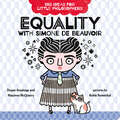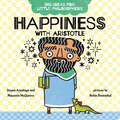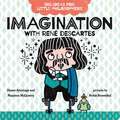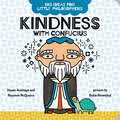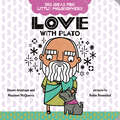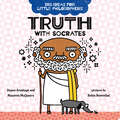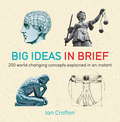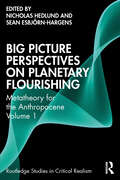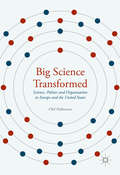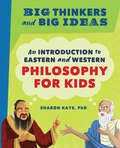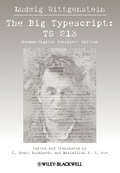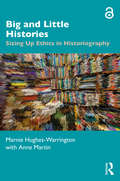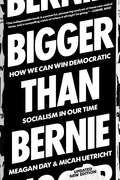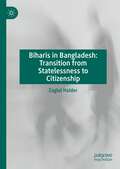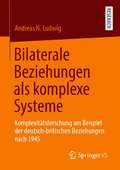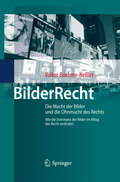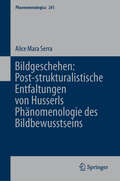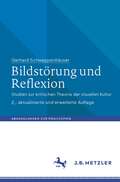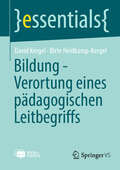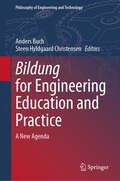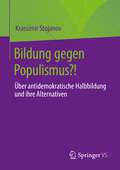- Table View
- List View
Big Ideas for Little Philosophers: Equality with Simone de Beauvoir (Big Ideas for Little Philosophers #1)
by Duane Armitage Maureen McQuerryExplore the importance of equality with the youngest readers in a wonderfully accessible way.Even little children have big questions about life. Simone de Beauvoir focused much of her work on the concept of equality, insisting that girls and boys and women and men should have the same opportunities to be happy. Everyone should have the right to be themselves and be treated with respect no matter what. Kids will come away from this book encouraged to think about how the same things can make girls and boys happy or sad or excited, and everyone should listen to who they are on the inside and respect that in others.Look for all six Big Ideas for Little Philosophers board books: Equality with Simone de Beauvoir, Truth with Socrates, Happiness with Aristotle, Imagination with René Descartes, Kindness with Confucius, Love with Plato, and Truth with Socrates.
Big Ideas for Little Philosophers: Happiness with Aristotle (Big Ideas for Little Philosophers #2)
by Duane Armitage Maureen McQuerryExplore the importance of happiness with the youngest readers in a wonderfully accessible way.Even little children have big questions about life. Finding happiness is a lifelong goal and Aristotle thought deeply about it. Why are we here? What is the best way to live a happy life? Having friends who are fun and adventurous is important, but it's also important to have true friends who will help us be good people and tell us when we're straying from that. He also believed we have to love ourselves in order to love others and be happy. This book will prompt readers to concentrate on what makes them happy and how they can be a good friend to others and themselves.Look for all six Big Ideas for Little Philosophers board books: Equality with Simone de Beauvoir, Truth with Socrates, Happiness with Aristotle, Imagination with René Descartes, Kindness with Confucius, Love with Plato, and Truth with Socrates.
Big Ideas for Little Philosophers: Imagination with René Descartes (Big Ideas for Little Philosophers #3)
by Duane Armitage Maureen McQuerryExplore the importance of imagination with the youngest readers in a wonderfully accessible way. Even little children have big questions about life. Imaginations are unique to every human on earth and René Descartes believed that is what makes every person their own true self. By thinking about what we imagine and how all people imagine differently, kids can work on understanding others' perspectives and points of view and become more empathetic. Imagination with René Descartes will help them see how using your imagination makes you "you" and understanding the same about friends and family is an important part of getting along in a community.Look for all six Big Ideas for Little Philosophers board books: Equality with Simone de Beauvoir, Truth with Socrates, Happiness with Aristotle, Imagination with René Descartes, Kindness with Confucius, Love with Plato, and Truth with Socrates.
Big Ideas for Little Philosophers: Kindness with Confucius (Big Ideas for Little Philosophers #5)
by Duane Armitage Maureen McQuerryExplore the importance of kindness with the youngest readers in a wonderfully accessible way.Even little children have big questions about life. Confucius believed always treating people with kindness can make us wise, and Kindness with Confucius brings his philosophy to the youngest thinkers. He believed we should use our own feelings as a guide to how to treat others. We feel good when people are kind to us and should want to make others feel that way. Emphasizing the importance of being in touch with your own emotions in order to be kind to others, this book will lead to inspiring conversations about human dynamics between people of all ages.Look for all six Big Ideas for Little Philosophers board books: Equality with Simone de Beauvoir, Happiness with Aristotle, Imagination with René Descartes, Kindness with Confucius, Love with Plato, and Truth with Socrates.
Big Ideas for Little Philosophers: Love with Plato (Big Ideas for Little Philosophers #6)
by Duane Armitage Maureen McQuerryExplore the importance of love with the youngest readers in a wonderfully accessible way.Even little children have big questions about life. Plato believed showing and receiving love makes us wise, and Love with Plato brings his philosophy to the youngest thinkers. Asking young readers what being loved feels like to them and how they can show others love prompts questions about how we treat one another and ourselves. This book will lead to inspiring conversations about loving people for what is on the inside, and helping others do the same.Look for all six Big Ideas for Little Philosophers board books: Equality with Simone de Beauvoir, Happiness with Aristotle,Imagination with René Descartes, Kindness with Confucius, Love with Plato, and Truth with Socrates.
Big Ideas for Little Philosophers: Truth with Socrates (Big Ideas for Little Philosophers #4)
by Duane Armitage Maureen McQuerryExplore the importance of truth with the youngest readers in a wonderfully accessible way.Even little children have big questions about life. Socrates believed being truthful and asking questions about the world can make us wise, and Truth with Socrates brings his philosophy to the youngest thinkers. From the importance of being honest even if it's hard or makes you scared to always asking questions to understand more about everything around you, this book will lead to inspiring conversations about human dynamics between people of all ages.Look for all six Big Ideas for Little Philosophers board books: Equality with Simone de Beauvoir, Truth with Socrates, Happiness with Aristotle, Imagination with René Descartes, Kindness with Confucius, Love with Plato, and Truth with Socrates.
Big Ideas in Brief: 200 World-Changing Concepts Explained In An Instant
by Ian CroftonBig Ideas in Brief provides an accessible and easily understood tour of 200 key concepts that really matter. The ideas covered come from a wide range of subjects - Philosophy, Religion, Science, Politics, Economics, Sociology, Anthropology, Psychology and the Arts. A series of short and lively articles accompanied by 100 illustrations introduce a host of diverse topics, all explained simply and clearly.
Big Ideas in Brief: 200 World-Changing Concepts Explained In An Instant (IN MINUTES)
by Ian CroftonBig Ideas in Brief provides an accessible and easily understood tour of 200 key concepts that really matter. The ideas covered come from a wide range of subjects - Philosophy, Religion, Science, Politics, Economics, Sociology, Anthropology, Psychology and the Arts. A series of short and lively articles accompanied by 100 illustrations introduce a host of diverse topics, all explained simply and clearly.
Big Picture Perspectives on Planetary Flourishing: Metatheory for the Anthropocene Volume 1 (Routledge Studies in Critical Realism)
by Sean Esbjörn-Hargens Nicholas HedlundThis book, split across two volumes, is a follow-up and companion to Metatheory for the Twenty-First Century (Routledge, 2016). All three of these volumes are the dialogical outcome of a multi-year symposia series wherein critical realists and integral theorists deeply engaged each other and their distinct but complementary approaches to integrative metatheory. Whereas Metatheory for the Twenty-First Century is primarily theoretical in its focus, Big Picture Perspectives for Planetary Flourishing: Metatheory for the Anthropocene aims to more concretely and practically address the complex planetary crises of a new era that many scholars now refer to as ‘the Anthropocene.’ In this first of two new volumes, participants of the symposia series articulate a variety of ‘big picture perspectives’ and transformative interventions in the domains of society and economics, social psychology, and education. Together, these chapters demonstrate how integrative metatheory and its application can make powerful contributions to planetary flourishing in the Anthropocene. With one of the defining characteristics of the Anthropocene being the sheer complexity and multi-valent nature of our interconnected global challenges, these volumes crucially present new forms of scholarship that can adequately weave together insights from multiple disciplines into new forms of metapraxis. As such, this book will be of interest to students, scholars, and practitioners in the areas of philosophy, social theory, critical realism, integral studies, metamodernism, and current affairs generally.
Big Science Transformed: Science, Politics and Organization in Europe and the United States
by Olof HallonstenThis book analyses the emergence of a transformed Big Science in Europe and the United States, using both historical and sociological perspectives. It shows how technology-intensive natural sciences grew to a prominent position in Western societies during the post-World War II era, and how their development cohered with both technological and social developments. At the helm of post-war science are large-scale projects, primarily in physics, which receive substantial funds from the public purse. Big Science Transformed shows how these projects, popularly called 'Big Science', have become symbols of progress. It analyses changes to the political and sociological frameworks surrounding publicly-funding science, and their impact on a number of new accelerator and reactor-based facilities that have come to prominence in materials science and the life sciences. Interdisciplinary in scope, this book will be of great interest to historians, sociologists and philosophers of science.
Big Thinkers and Big Ideas: An Introduction to Eastern and Western Philosophy for Kids
by Sharon Kaye Ph.D.An introductory guide to Eastern and Western philosophy for kids ages 8 to 12 Philosophy is both fun and good for kids' brains, as it encourages them to think deeply and develop their own solutions to complex problems. With this colorful book about philosophy for kids, they'll learn all about introductory concepts and important thinkers in a way that's fun and approachable, but still in-depth and substantial. Your child will explore questions like: "What is real?", "How do I know something is true?", "How can I be a good person?", and "If this is true, what else is true?" A detailed glossary offers easy-to-understand definitions for the more advanced words and ideas in the book. Dive into philosophy for children with: An intro to philosophy—Get essential information about the origins of philosophy, the different branches, and the benefits of studying it. The four main branches—Discover the main branches of philosophy: metaphysics (reality), epistemology (knowledge), logic (critical thinking), and ethics (values). Philosopher profiles—Learn about different kinds of philosophy from all over the world and details about philosophers like Socrates, Pythagoras, Nancy Fraser, and Neil deGrasse Tyson. Inspire your child to think deeply with this perfect introduction to philosophy for kids.
Big Typescript
by Ludwig Wittgenstein C. Grant Luckhardt Maximilian E. AueLong awaited by the scholarly community, Wittgenstein's so-called "Big Typescript" (von Wright Catalog # TS 213) is presented here in an en face English-German scholar's edition. Presents scholar's edition of important material from 1933, Wittgenstein's first efforts to set out his new thoughts after the publication of the "Tractatus Logico Philosophicus" Includes indications to help the reader identify Wittgenstein's numerous corrections, additions, deletions, alternative words and phrasings, suggestions for moves within the text, and marginal comments
Big and Little Histories: Sizing Up Ethics in Historiography
by Anne Martin Marnie Hughes-WarringtonThis book introduces students to ethics in historiography through an exploration of how historians in different times and places have explained how history ought to be written and how those views relate to different understandings of ethics. No two histories are the same. The book argues that this is a good thing because the differences between histories are largely a matter of ethics. Looking to histories made across the world and from ancient times until today, readers are introduced to a wide variety of approaches to the ethics of history, including well-known ethical approaches, such as the virtue ethics of universal historians, and utilitarian approaches to collective biography writing while also discovering new and emerging ideas in the ethics of history. Through these approaches, readers are encouraged to challenge their ideas about whether humans are separate from other living and non-living things and whether machines and animals can write histories. The book looks to the fundamental questions posed about the nature of history making by Indigenous history makers and asks whether the ethics at play in the global variety of histories might be better appreciated in professional codes of conduct and approaches to research ethics management. Opening up the topic of ethics to show how historians might have viewed ethics differently in the past, the book requires no background in ethics or history theory and is open to all of those with an interest in how we think about good histories.
Bigger Than Bernie: How We Go from the Sanders Campaign to Democratic Socialism
by Micah Uetricht Meagan DayWin or lose, Bernie has reshaped the landscape of American politics. Where does the political revolution go next?The political ambitions of the movement behind Bernie Sanders have never been limited to winning the White House. Since Bernie first entered the presidential primaries in 2016, his supporters have worked to organize a revolution intended to encourage the active participation of millions of ordinary people in political life. That revolution is already underway, as evidenced by the massive growth of the Democratic Socialists of America, the teachers Bernie motivated to lead strikes across red and blue states, and the rising new generation of radicals in Congress—led by Alexandria Ocasio-Cortez and Ilhan Omar—inspired by his example.In Bigger than Bernie, activist writers Meagan Day and Micah Uetricht give us an intimate map of this emerging movement to remake American politics top to bottom, profiling the grassroots organizers who are building something bigger, and more ambitious, than the career of any one candidate. As participants themselves, Day and Uetricht provide a serious analysis of the prospects for long-term change, offering a strategy for making &“political revolution&” more than just a campaign slogan. They provide a road map for how to entrench democratic socialism in the halls of power and in our own lives.Bigger than Bernie offers unmatched insights into the people behind the most unique campaign in modern American history and a clear-eyed sense of how the movement can sustain itself for the long haul.
Biharis in Bangladesh: Transition from Statelessness to Citizenship
by Zaglul HaiderThis book deals with the citizenship status of the Biharis in Bangladesh and their ability to access rights associated with citizenship. The main argument of the book is that although legally the Biharis are citizens of Bangladesh, they still do not have access to many important rights of citizenship that can make their citizenship meaningful. Their inability to access many important citizenship rights made them de facto stateless, although they are de-jure citizens. Taking a law and society approach this book examines both legal and non-legal factors behind the deplorable conditions of the Biharis in Bangladesh. Based on fieldwork, this book analyses that the Biharis’ inability to access citizenship rights is inconsistent with citizenship theory, citizenship laws, and the Constitution of Bangladesh. To make the Biharis citizenship effective or meaningful the author suggests some recommendations for policy changes that would enable Biharis to access rights associated with citizenship.
Bihozberatasunaz
by Elena Zalakain Lazpiur Igor Yarza Iraola Luzio A. SenekaBaina, zergatik ez du barkatuko? Zehatz dezagun orain, bada, zer den barkamena, eta ikusiko dugu jakitunak ez duela eman behar. Barkamena zigor mereziaren absoluzioa da. Jakitunak zergatik ez duen eman behar luze azalduko dizute gai hori espresuki jorratu dutenek. Nik, ez dagokidan epaian banengo bezala, labur aritze aldera, zera esango dizut: barkamena ematen zaio zigorra jaso beharko lukeenari, baina jakitunak ez du aintzakotzat hartzen egin behar ez duen ezer. Beraz, zigorra jartzeko betebeharra duenez, ez du barkatuko. Baina barkamenaren bitartez lortu nahi duzuna beste bide duinago batek emango dizu. Izan ere, jakituna bihozbera izango da, ardura hartu eta zuzenduko du; barkamena emango balu bezala egingo du, baina ez du barkatuko, barkatzen duenak egin beharreko zerbait ez duela egin onartzen baitu.
Bikario Savoiarraren fede-aitortza
by Jean-Jacques Rousseau Esteban Antxustegi IgartuaUnibertsoaren ordenaz pentsatzen dut, ez sistema hutsekin azaltzeko bakarrik, hura etengabe miresteko eta unibertsoan sentitzen den haren egile jakintsua gurtzeko baizik. Harekin mintzatzen naiz, haren esentzia jainkotiarrez betetzen ditut nire ahalmenak, haren onurek hunkitzen naute, haren dohainak bedeinkatzen ditut, baina ez dut otoitzik egiten. Zer eskatuko diot? Gauzen bilakaera nigatik alda dezala? Nire aldeko mirariak egin ditzala? Nahi al nuke nik, gauza guztien gainetik haren jakinduriak ezarritako eta haren probidentziak iraunarazitako ordena maitatu behar duen honek, halako ordena nire erruz nahastea? Ez, horrelako eskaera ausartegia onartu beharrean, zigortu egin beharko litzateke. Ongia egiteko ahalmena ere ez diot eskatzen. Zergatik eskatuko diot jadanik eman didana? Ez al dit eman kontzientzia ongia maitatzeko, arrazoia ezagutzeko eta askatasuna hautatzeko? Gaizki egiten badut, ez dut aitzakiarik; nahi dudalako egiten dut: nire borondatea alda dezala eskatzea hark niri eskatzen didana eskatzea da, berak lan egitea eta nik soldata kobratzea nahi izatea da; nire mailarekin pozik ez egotea, gizakia ez izatea nahi izatea da, eta, existitzen denetik kanpoko zerbait nahi izatea desordena eta gaizkia nahi izatea da.
Bilaterale Beziehungen als komplexe Systeme: Komplexitätsforschung am Beispiel der deutsch-britischen Beziehungen nach 1945
by Andreas N. LudwigDie Studie liefert einen innovativen Beitrag zur Komplexitätsforschung in den Internationalen Beziehungen und deren Beschäftigung mit bilateralen Beziehungen. Andreas N. Ludwig entwickelt auf der wissenschaftsphilosophischen Grundlage komplexen Denkens (u.a. nach Edgar Morin) sowie in Auseinandersetzung mit der Entwicklung des deutsch-britischen Gefüges eine neue, systemtheoretische wie historische Perspektive auf das zentrale Phänomen des Austauschs zweier Akteure im Rahmen des globalen Miteinanders. Er fasst in diesem Zuge Dyaden als komplexe Beziehungssysteme auf, für deren Untersuchung er die Methode eines komplexen Narrativs vorschlägt. Seine verstehende Rekonstruktion der zeitgebundenen Themenfelder sowie von Dynamik und Wandel des Verhältnisses von Deutschen und Briten nach 1945 geht dabei ferner eine auffällige Lücke der politikwissenschaftlichen Forschung der letzten Jahrzehnte an.
BilderRecht: Die Macht der Bilder und die Ohnmacht des Rechts Wie die Dominanz der Bilder im Alltag das Recht verändert
by Volker Boehme-NeßlerWir leben in einer Bilderwelt. Die Folgen sind - im wahrsten Sinn des Worts - unübersehbar. Was bedeutet die Dominanz der Bilder für das Recht? Bisher ist das Recht sehr bilderskeptisch. Das wird kaum so bleiben können, denn wenn sich ein Recht zu weit vom Leben entfernt, wird es über kurz oder lang an Bedeutung verlieren. Welche Chancen und Risiken ergeben sich, wenn Parlamente, Verwaltungen, Gerichte und Anwälte visuell kommunizieren? Der Autor diskutiert die Frage, wie ein BilderRecht aussehen könnte.
Bildgeschehen: Post-strukturalistische Entfaltungen von Husserls Phänomenologie des Bildbewusstseins (Phaenomenologica #241)
by Alice Mara SerraDieses Buch geht von der Frage aus, wie Bilder erscheinen und in ihrem Geschehen als Bild auf etwas hinweisen, das mit dem Phänomen selbst nicht zusammenfällt. Es wendet sich zunächst Husserls Analysen zum Bildbewusstsein zu und zeigt anhand einiger seiner Anmerkungen, wie in post-strukturalistischen Ansätzen und ihren Wirkungen im Denken von Jacques Derrida, Gilles Deleuze, Roland Barthes, Hubert Damisch und Georges Didi-Huberman die Bildphänomenologie entfaltet oder verschieben wird. Zuerst lassen sich mit Jacques Derridas dekonstruktivem Denken in seinen intertextuellen Hinweisen auf Husserls Phänomenologie sowohl Beiträge der Phänomenologie zum Bildgeschehen als auch deren Grenzen hervorheben. Indem diese Schrift die phänomenologische Forschung im Kontext der „Ikonischen Wende“ des 20. Jahrhunderts situiert, erweitert sie ebenso ihre Wirkungsgeschichte hin zu Fragen nach Zeichen und Bild, Dekonstruktionen des perspektivischen Blicks, zur Philosophie der Zeichnung und der Photographie. Sie richtet sich an in diesen Bereichen Forschende und an Phänomenologie, französischem Post-strukturalismus und zeitgenössischer Bildtheorie interessierte Lesende. This book departs from the investigation into how images appear and, in their event as images, points to something that does not quite coincide with the phenomenon itself. It first turns to Husserl's analyses of image consciousness and on the basis of some of his remarks shows how image phenomenology is deployed or displaced in post-structuralist approaches and their effects in the thinking of Jacques Derrida, Gilles Deleuze, Roland Barthes, Hubert Damisch and Georges Didi-Huberman. Principally based on the deconstructive thinking of Jacques Derrida in its intertextuality with Husserl’s phenomenology, both the contributions and certain limitations of the phenomenology of image consciousness are emphasized. By situating phenomenological research in the context of the "iconic turn" of the twentieth century, this publication extends its scope to questions of sign and image, deconstructions of the perspectival gaze, philosophy of drawing and photography. It appeals to researchers working in these fields and readers with an interest in phenomenology, French post-structuralism and contemporary image theories. Based on the deconstructive thinking of Jacques Derrida in its intertextuality with Husserl’s phenomenology, one can point out both the contributions and certain limitations of the phenomenology of image consciousness. This volume contributes to phenomenological research in the context of the "Iconic Turn" of the twentieth century and extends this legacy. It appeals to researchers and students working in the field.
Bildstörung und Reflexion: Studien zur kritischen Theorie der visuellen Kultur (Abhandlungen zur Philosophie)
by Gerhard SchweppenhäuserDie Essays versammeln begründende und angewandte Überlegungen zu einer kritischen Theorie der visuellen Kultur. Sie zeigen, wie die begriffliche Konstruktion struktureller und historischer Wesensmerkmale der hoch- und spätkapitalistischen Gesellschaft und deren Antagonismen im Bereich von Kunst und Kultur in den letzten 100 Jahren bis heute in den Grundzügen und im Detail aussieht. Alle Texte, die in der ersten Auflage von 2013 enthalten waren, wurden für die Neuausgabe intensiv überarbeitet und z.T. erweitert. Einige wurden herausgenommen und durch aktuellere Texte ersetzt. Hinzu kommt ein unveröffentlichter Essay zur Medienphilosophie. Der Band ist in der Neuausgabe in drei Abteilungen gegliedert: Grundbegriffe und Konzeptionen, Autoren und Modelle sowie Themen und Anwendungen. Der erste Teil ist dem Subjektbegriff und dem Kulturbegriff in der Kritischen Theorie gewidmet. Im zweiten Teil werden Ansätze von Marcuse und Adorno dargestellt und interpretiert. Im dritten Teil geht es um Bild- und Kunstbegriffe in der Kritischen Theorie sowie um ein Konzept kritischer Medienphilosophie. Bildtheorien aus dem Bereich der Frankfurter Schule sind im bildwissenschaftlichen Diskurs noch kaum vertreten. Dabei sind Konzepte des Bildes bei Adorno, Horkheimer, Marcuse und Benjamin nicht nur in der Ästhetik wichtig, sondern auch in der Geschichtsphilosophie sowie in der Wahrnehmungs- und Erkenntnistheorie.
Bildung - Verortung eines pädagogischen Leitbegriffs (essentials)
by David Kergel Birte Heidkamp-KergelDas essential bietet eine fundierte und kompakte Einführung in den Bildungsbegriff. Es schlägt einen Bogen von seinen philosophischen Wurzeln und klassischen Bildungstheorien bis hin zu aktuellen Paradigmen der Bildungsforschung. Bildung erscheint dabei als Selbst- und Weltverhältnis, als Persönlichkeitsentfaltung, Kompetenzentwicklung sowie als ethische Aufgabe.Behandelt werden unter anderem geisteswissenschaftliche, kritische und empirische Perspektiven sowie disziplinäre Konzepte wie kulturelle, ästhetische, inklusive und frühkindliche Bildung. Reflexionsimpulse zu Halbbildung, Bildungsethik und digitalen Herausforderungen runden den Band ab. Ein begleitender Online-Kurs bietet vertiefende Materialien und praxisnahe Anregungen. Den kostenlosen Zugang zum Online-Kurs finden Sie direkt im Buch.
Bildung for Engineering Education and Practice: A New Agenda (Philosophy of Engineering and Technology #49)
by Steen Hyldgaard Christensen Anders BuchUsing the concept of Bildung as a framework, which in late capitalism/postmodernity may be perceived to include critical knowledge, value consciousness, ethics, and social responsibility (including sustainability), this project aims to investigate the underlying aspirations, structures, and dynamics of change taking place in engineering education and practice through conversations between engineering, social sciences, and the humanities. Calling upon the spirit of philosophers on Bildung such as John Dewey, Jürgen Habermas and contemporaries, the focus of the present project is on broadening engineering education initiatives and practice that follow normative understandings of Bildung. This volume appeals to researchers and students working in philosophy, engineering, and education.
Bildung für nachhaltige Entwicklung zwischen politischer Erwartung und schulischer Praxis: Eine bildungs- und umweltsoziologische Analyse
by Johanna WeselekDas zentrale Erkenntnisinteresse der Studie bezieht sich auf die Frage, wie Nachhaltigkeit in Form einer Bildung für nachhaltige Entwicklung Einzug in das Bildungssystem findet und im Schulalltag von Lehrkräften wahrgenommen, thematisiert und praktiziert wird. Für die Beantwortung der Frage wurde eine qualitativ-rekonstruktive Untersuchung mithilfe der dokumentarischen Methode durchgeführt. Bildung für nachhaltige Entwicklung aus soziologischer Perspektive zu betrachten, ermöglicht eine kritische Auseinandersetzung mit der politischen Forderung, durch vermehrte Bildung zu einer nachhaltigeren Entwicklung beizutragen.
Bildung gegen Populismus?!: Über antidemokratische Halbbildung und ihre Alternativen
by Krassimir StojanovBildung kann und soll von ihrem Begriff her Populismus entgegenwirken; die tatsächliche Bildungspraxis begünstigt jedoch oft seine Verbreitung. Diese Praxis stilisiert vielfach Herkunft und „kulturelle Identität“ als absolute Faktoren hoch, die individuelles Handeln und Denken angeblich determinieren. Auf der Grundlage der bildungsphilosophischen Schriften von Humboldt, Dewey, Adorno und vor allem Hegel sowie anhand von einschlägigen Fallbeispielen entwickelt das Buch ein Alternativmodell institutionalisierter Bildung, das auf die Kultivierung von autonomer Individualität durch die begriffliche Selbst-Artikulation der je einzigartigen Erfahrungen, Anliegen, Ideale und Werte der Einzelnen ausgerichtet ist. Dieses Model bezweckt die Befähigung aller Schüler*innen zu demokratischer Partizipation und – damit verbunden – ihre Immunisierung gegen populistische Ideologien.
